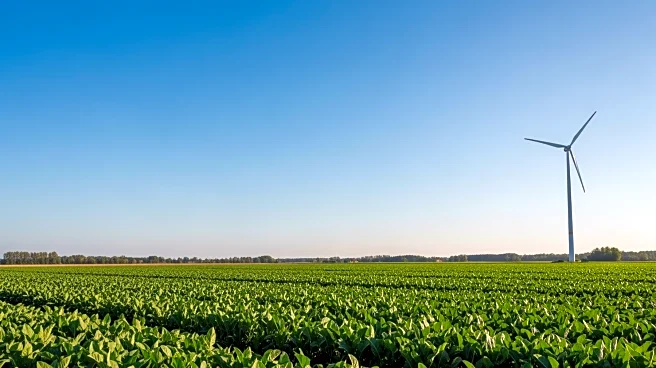What's Happening?
During a recent Climate Week panel, journalist Michael Grunwald and Britt Groosman, Vice President of Climate and Nature at the Environmental Defense Fund, discussed the significant environmental impact
of agriculture. Grunwald emphasized that agriculture is a major environmental challenge, using 70% of the world's fresh water and being a leading cause of deforestation. The panelists highlighted the need to re-engineer agriculture to be more climate-smart, focusing on increasing productivity on existing farmland and reducing food waste. They also discussed the misconceptions about organic and grass-fed farming, noting that these methods often require more land and can have a higher climate footprint.
Why It's Important?
The discussion underscores the urgent need to address agriculture's environmental impact, as it is responsible for a significant portion of global greenhouse gas emissions. The panelists argue that technological innovation, rather than austerity, is key to creating a sustainable food system. This includes developing climate-resilient crops, improving livestock efficiency, and reducing food waste. The potential benefits are substantial, offering 'triple wins' for farmers, income, and the planet. The conversation reflects a broader shift in climate policy, where agriculture is becoming a central focus, highlighting the importance of sustainable practices in feeding a growing global population.
What's Next?
The panelists suggest that the future of agriculture lies in technological advancements and increased investment in research and development. Innovations such as gene-edited crops, alternative fertilizers, and AI-assisted farming techniques are expected to play a crucial role in reducing agriculture's environmental footprint. Additionally, there is a call for increased efficiency in livestock production, particularly in developing regions, to reduce emissions and land use. The conversation indicates a growing recognition of agriculture's role in climate change and the need for collaborative efforts to develop sustainable solutions.
Beyond the Headlines
The panelists' discussion highlights the ethical and moral dimensions of agriculture's environmental impact. The use of vast amounts of water and land for food production, much of which is wasted, raises questions about resource allocation and sustainability. The conversation also challenges common perceptions about organic and small-scale farming, suggesting that industrial farming, despite its drawbacks, may offer more efficient solutions. This shift in perspective could influence future agricultural policies and consumer choices, as society grapples with balancing food production needs with environmental conservation.










